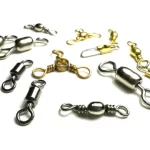Surfcasting is a diverse sport with varied techniques and preferences. While it may be enticing to have a rod for every style of surf fishing, practicality often demands that surfcasters be generalists. Let’s explore some key factors to consider when choosing a surf rod that can handle multiple techniques effectively.
- Length Matters: When it comes to surf rod length, it’s often a matter of personal preference. Shorter rods are lighter and easier to cast, making them a choice for some anglers. Longer rods can help keep your line above obstacles like rocks and structures. Typically, anglers adapt the rod length based on the location and fishing style.
- Understanding Action: The “action” of a fishing rod indicates how much it flexes. It’s a crucial factor that affects how well-suited a rod is for a particular fishing style. Rods can be fast, moderate, or slow-action. Fast rods have a stiff tip, suitable for casting lighter lures. Slow-action rods bend throughout, making them better for casting heavy weights and providing a more forgiving feel when fighting fish.

- Casting Preference: For casting, your rod’s action is paramount. Moderate or slow-action rods are excellent for most surfcasting styles. They allow for smooth, flowing lure presentations that attract fish, especially in low-light conditions. While fast-action rods are suitable for certain lures, moderate-action rods are versatile and perform well with a variety of baits.
- Fighting Fish: When fighting large fish, a more moderate-action rod is often preferred because it fights the fish, allowing the angler better control. It acts as a shock absorber, reducing the risk of bent or pulled hooks during a heavy load.
- Starting Point: Begin with a 10-foot, moderate-action rod rated for 2- to 5-ounce lures as a versatile starting point. Adjust your rod choice based on your specific fishing location and preferences. If you need more distance, consider increasing line diameter. Choose rod length based on the environment you fish in. If you predominantly use smaller lures, select a rod with a lower weight rating.
- The Power of Familiarity: Regardless of your surf rod’s specifications, becoming intimately familiar with your rod is essential. Knowing how it behaves in different situations, such as when casting specific lures or fighting fish, is key to successful surfcasting.
While it may seem appealing to have a specialized rod for every surfcasting technique, it’s often more practical to choose a versatile rod that can adapt to various styles. The ideal surf rod should be tailored to your fishing environment, casting preferences, and lure choices. Remember, it’s the angler’s familiarity and skill that make the most significant impact in successful surfcasting.
Images/Source: OnTheWater





